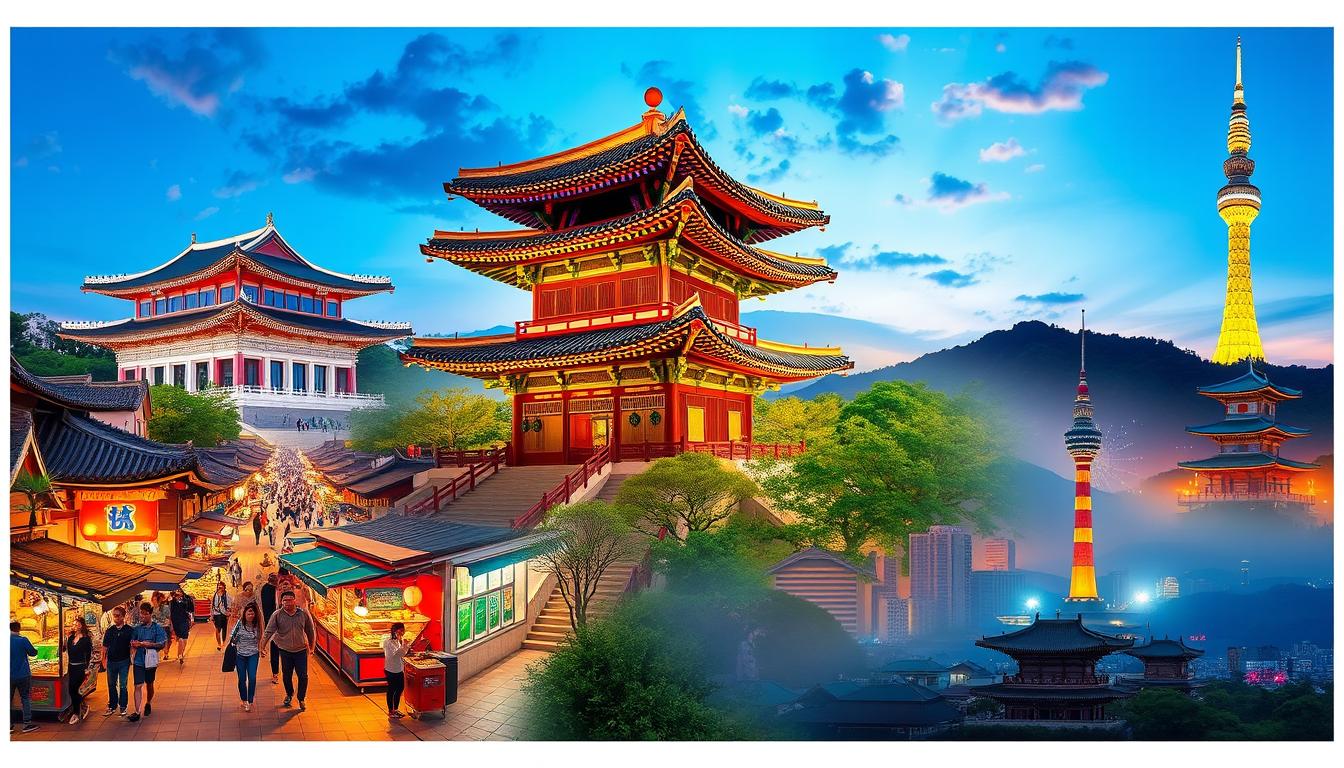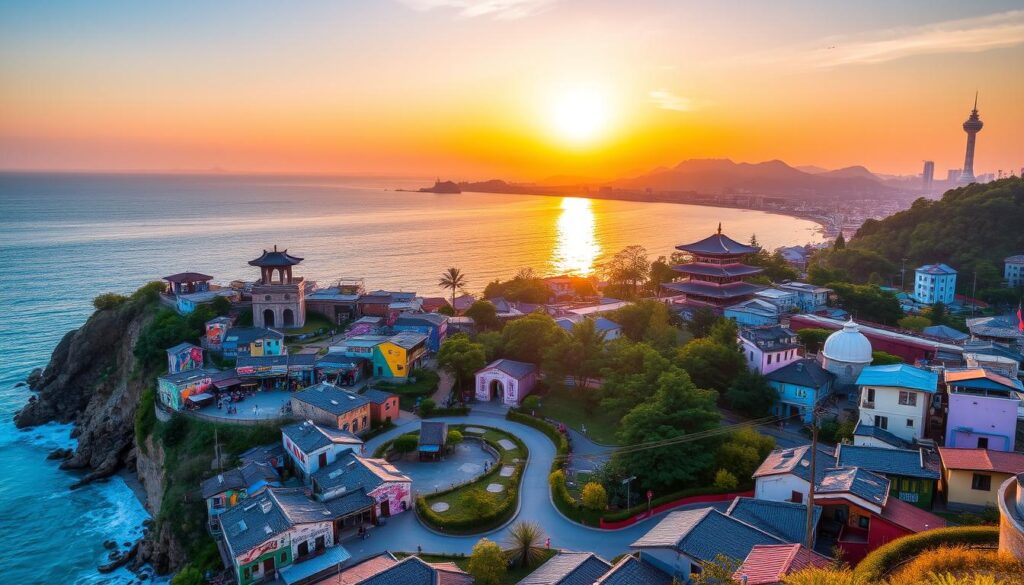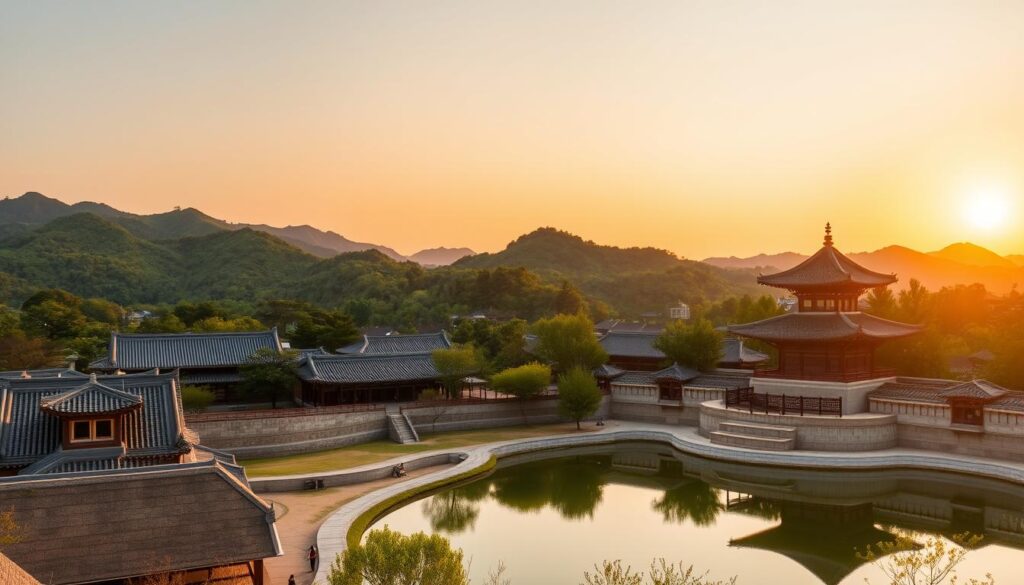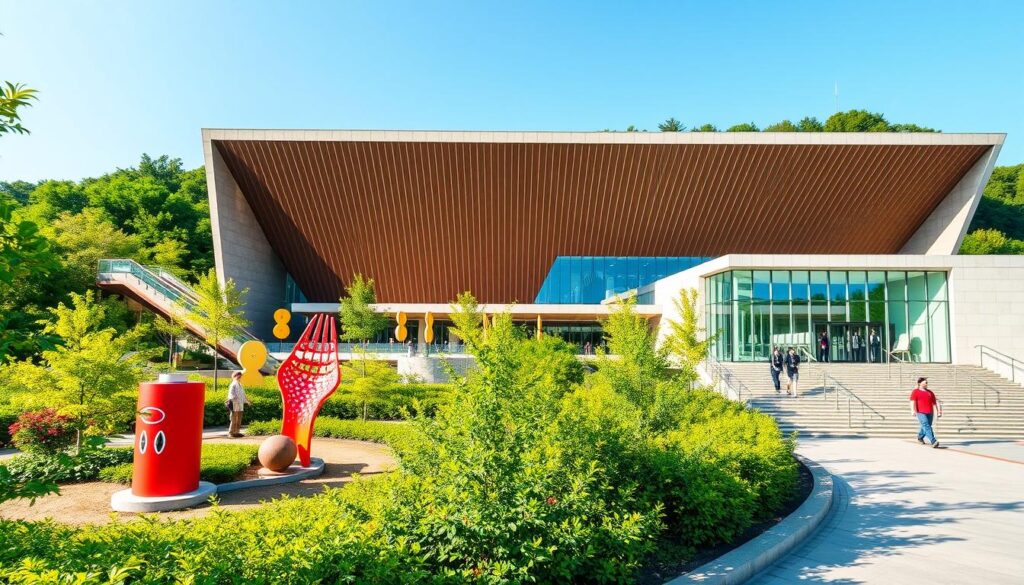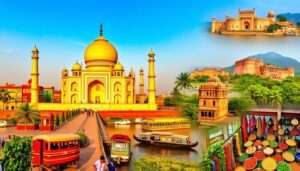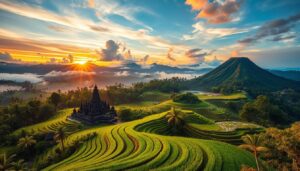As an American traveler, I’ve been drawn to South Korea’s diverse spots. From Seoul’s bright lights to Jeju Island’s calm, this country is full of culture and beauty. It’s perfect for history buffs, food lovers, or those seeking outdoor adventures.
South Korea’s fast growth has made it a modern powerhouse. It’s now Asia’s fourth-largest economy, with a high quality of life and great tourist facilities. Yet, it still keeps its old traditions alive, mixing ancient with modern.
Key Takeaways
- South Korea offers a diverse range of cultural experiences, from the vibrant streets of Seoul to the serene landscapes of Jeju Island.
- The country has undergone rapid economic growth, transforming it into a modern destination while preserving its rich cultural heritage.
- South Korea’s tourism infrastructure is well-developed, catering to a wide variety of travelers and their interests.
- Visitors can explore ancient historical sites, enjoy delectable Korean cuisine, and immerse themselves in the country’s natural beauty.
- South Korea is a captivating destination that blends modernity and tradition, offering a unique and unforgettable travel experience.
Exploring the Vibrant Streets of Seoul
Seoul, the bustling capital of South Korea, is a mix of old traditions and new wonders. As I step out, I feel the city’s lively energy. From Gyeongbokgung Palace’s grandeur to Myeongdong’s trendy fashion, Seoul has something for everyone.
The Historic Beauty of Gyeongbokgung Palace
Gyeongbokgung Palace is a must-see in Seoul, showing Korea’s rich history. Built in 1395, it’s been beautifully restored. Walking through its courtyards, I admire the Joseon Dynasty’s splendor and appreciate Korea’s Korean temples and shrines.
Unique Shopping Experiences in Myeongdong
Myeongdong is Seoul’s top shopping spot. It’s filled with Seoul attractions, from fancy boutiques to street food. I get lost in the crowds, checking out Korean beauty products and tasty street food.
The Charm of Bukchon Hanok Village
Bukchon Hanok Village is a hidden gem in Seoul. It’s a cluster of traditional Korean houses, or hanok. Walking through its alleys, I feel calm and appreciate Korea’s Korean temples and shrines.
“Seoul is a city that seamlessly blends the old and the new, offering a truly unique travel experience.”
Delving into the Chill Vibes of Busan
Busan, the vibrant port city of South Korea, has a unique charm that draws visitors. It boasts stunning beaches and bustling markets. This coastal gem offers a wide range of experiences for every traveler.
Beautiful Beaches: Haeundae and Gwangalli
Haeundae and Gwangalli beaches are Busan’s highlights. Haeundae Beach is known for its golden sands and lively vibe. It’s perfect for those looking for sun, sand, and fun.
Gwangalli Beach offers a more laid-back atmosphere. Its picturesque promenade and views of the Gwangan Bridge are stunning.
Stunning Views at Gamcheon Culture Village
Gamcheon Culture Village was once a refugee camp. Now, it’s a vibrant artistic community. The colorful alleys, quaint galleries, and cafes are a feast for the senses.
The village offers breathtaking views of the city’s skyline. It’s a must-see for anyone visiting Busan.
The Excitement of Jagalchi Fish Market
Jagalchi Fish Market is a must-visit in Busan. It’s a hub for Korean cuisine delicacies. Here, you can buy fresh seafood and have it cooked in nearby restaurants.
The market’s lively atmosphere and variety of seafood make it unforgettable. It’s a top Busan tourist spot.
Exploring Busan’s streets reveals a mix of modern architecture, rich culture, and natural beauty. Whether you’re looking for beach relaxation, artistic charm, or fresh seafood, Busan has it all.
“Busan is a city that effortlessly balances the bustling energy of a port town with the tranquility of its coastal landscapes. It’s a place where you can indulge in Korean cuisine delicacies and immerse yourself in the rich cultural tapestry of South Korea.”
The Serenity of Jeju Island’s Nature
Jeju Island is a peaceful haven off the Korean peninsula’s southern coast. It invites visitors to explore its natural wonders. As South Korea’s largest island, it’s perfect for those wanting to leave city life behind and enjoy nature’s calm.
Hiking the Majestic Hallasan Mountain
At Jeju Island’s heart is Hallasan Mountain, South Korea’s highest peak at 1,947 meters (6,388 feet). This UNESCO site offers a challenging yet rewarding hike. Trails go through lush forests to a stunning crater lake at the summit. It’s a top choice for adventurous travelers.
Discovering the Wonders of Seongsan Ilchulbong
The Seongsan Ilchulbong, or Sunrise Peak, is another natural marvel on Jeju’s eastern coast. It’s famous for its stunning sunrises. Visitors come from everywhere to see the sun rise over the cliffs and coastal views.
Relaxing at Jeju’s Beautiful Beaches
Jeju’s coastline has black lava stone, soft-sand beaches, and cliffs. It offers many scenic views. Places like Hyeopjae Beach and Jungmun Beach are great for relaxation. You can also explore Udo Island and its cycling routes.
“Jeju Island is a true gem in South Korea’s natural landscape, a place where the forces of nature have sculpted a breathtaking paradise for all to enjoy.”
| Key Facts about Jeju Island | Statistics |
|---|---|
| Highest Mountain | Hallasan Mountain, 1,947 meters (6,388 feet) |
| Longest Lava Cave | Manjanggul Cave, over 13 kilometers (8 miles) |
| Olle Hiking Trails | 26 trails covering 425 kilometers (264 miles) |
| UNESCO Heritage Sites | Hallasan National Park, Seongsan Ilchulbong |
Cultural Richness in Gyeongju
Gyeongju, once the capital of the Silla dynasty, is a treasure trove of Korean culture. It’s filled with ancient sites and artifacts that show the country’s rich past. As a UNESCO World Heritage site, it’s a key place for those wanting to dive into Korea’s history and culture.
Uncovering the Secrets of Bulguksa Temple
The Bulguksa Temple is a gem in Gyeongju, showcasing Buddhist architecture and the region’s spiritual side. This UNESCO site has detailed stone carvings, calm pagodas, and a peaceful vibe. Walking through the temple, you feel connected to Korea’s cultural heritage.
Historical Significance of Seokguram Grotto
The Seokguram Grotto is another top spot in Gyeongju, a rock-carved Buddhist shrine from the 8th century. It’s a UNESCO site with a stunning Buddha statue and detailed carvings. Visiting here is a deep and moving experience, showing the art and spirituality of ancient Korea.
To really get into Gyeongju’s culture, plan to stay for two to three nights. This lets you explore more of the city’s history, learn about its temples and tombs, and understand the Silla dynasty’s lasting impact.
“Gyeongju is known as a ‘Museum Without Walls’ due to the overwhelming number of historical treasures in the city.”
Enjoying the Bustle of Incheon
Incheon is a major port city just west of Seoul. It offers a mix of modern and traditional Korean culture. From Songdo’s cutting-edge architecture to Incheon Chinatown’s vibrant energy, the city attracts many visitors.
Visiting the Modern Architecture of Songdo
Songdo is a planned city in Incheon known for its urban design and innovation. It features stunning skyscrapers, green spaces, and a walkable layout. You can explore Central Park, see the waterfront architecture, and shop at Hyundai Premium Outlets.
Strolling Through Incheon Chinatown
Incheon Chinatown is one of South Korea’s largest. It’s a cultural gem with traditional alleyways, Chinese restaurants, shops, and street art. It’s a place where Chinese and Korean cultures meet.
Incheon is a key spot for international trade and travel. It draws visitors from everywhere. Whether you like modern Songdo or cultural Chinatown, Incheon offers a memorable experience.
“Incheon is a fascinating blend of old and new, where the modern marvels of Songdo stand in contrast to the authentic charm of Chinatown. It’s a city that offers a truly diverse range of Korean cultural experiences for visitors to explore.”
The Unique Experience of Suwon
Suwon, the capital of Gyeonggi Province, is a captivating destination. It blends rich Korean cultural experiences with stunning natural beauty. As one of the best places to visit in South Korea, Suwon offers a diverse range of attractions. These attractions showcase the country’s architectural, historical, and culinary heritage.
Exploring the Impressive Hwaseong Fortress
At the heart of Suwon’s cultural landscape stands the Hwaseong Fortress. This fortress is a UNESCO World Heritage site from the late 18th century. It showcases the ingenuity and craftsmanship of the Joseon Dynasty.
Visitors can explore the fortress’s intricate walls, gates, and observation posts. Each has its own designated Korean name. This allows visitors to gain a deeper understanding of the country’s Korean cultural experiences.
The Gwanggyo Lake Park Experience
Beyond the historic grandeur of the fortress, Suwon offers a serene natural escape at the Gwanggyo Lake Park. This tranquil oasis features walking trails, recreational facilities, and stunning views. It provides a refreshing respite from the bustling city.
The park’s picturesque landscapes make it an ideal destination. It’s perfect for those seeking to immerse themselves in the best places to visit in South Korea.
Suwon is also renowned for its delectable Korean barbecue. The marinated short ribs known as galbi are a local culinary specialty. This allows visitors to further immerse themselves in the Korean cultural experiences that make Suwon a truly remarkable destination.
“Suwon’s blend of history, culture, and natural beauty makes it a must-visit destination for anyone exploring the best places to visit in South Korea.”
Immersing in Korean Tradition in Andong
Andong, in the heart of South Korea, is a treasure for those wanting to dive into Korean culture. It’s known as Korea’s spiritual capital, with a rich heritage. Visitors get a peek into Korea’s history here.
Discovering Hahoe Folk Village
The Hahoe Folk Village in Andong is a UNESCO site that shows off Korea’s Confucian culture. You can see hanok houses and learn about traditional mask-making. Don’t miss the Hahoe Mask Dance performances.
Participating in the Mask Dance Festival
The Andong Mask Dance Festival is a big deal in Andong. It happens every September and October. You can see traditional mask dances and learn about mask-making. It’s a chance to dive into the city’s cultural history.
Andong is also known for its food, like Andong Jjimdak and soju. Walking around, you’ll smell Korean dishes everywhere. It makes your visit even more special.
Andong is perfect for exploring Confucian heritage, cultural festivals, and local food. It’s a place where you can really feel Korean culture. It’s one of the best places to visit in South Korea.
The Artistic Allure of Daegu
Daegu, in the heart of South Korea, is a city that draws visitors with its lively arts scene. It’s the fourth-largest city and is known for its rich culture and support for creativity.
Visiting the Daegu Art Museum
The Daegu Art Museum is a key part of the city’s art world. It has a wide range of Korean contemporary art. You can see everything from paintings and sculptures to digital art.
Here, you can dive into the city’s artistic heart. You’ll find works by both famous and new Korean artists.
Enjoying the City’s Festivals and Events
Daegu is full of cultural festivals and events all year. In spring, the Dalgubeol Lantern Festival, Daegu Chimac Festival, and Daegu Yangnyeongsi Herb Medicine Festival happen. They show off the city’s traditions and heritage.
Daegu also has the Daegu International Musical Festival and the Colorful Daegu Festival. These events highlight the city’s lively performing arts.
Daegu is more than its museums and festivals. It’s famous for its textile industry and traditional medicine market. Seomun Market is a must-see. It’s filled with handmade fabrics, crafts, and tasty street food.
“Daegu is a city that celebrates the intersection of tradition and modernity, where the rich cultural heritage of Korea is seamlessly woven into a vibrant, contemporary landscape.”
If you love art, culture, or just want to experience something new, Daegu is perfect. From the Daegu Art Museum to the city’s festivals, there’s always something exciting to find in this South Korean gem.
Admiring the Scenic Views of Sokcho
Sokcho is the entrance to Seoraksan National Park, a place of stunning beauty and rich culture. The park’s peaks, over 1,700 meters high, attract visitors from everywhere. The Ulsanbawi Rock hike offers amazing views and a chance to see unique plants and animals.
The coastline along the East Sea in Sokcho is also breathtaking. Sokcho Beach, with its white sand, is great for relaxing and trying local seafood. The Daepo Port is full of seafood stalls, offering dishes like seafood tempura and bibimbap.
Sokcho’s culture is just as captivating, with places like Sinheungsa Temple and Abai Village. The village is home to North Korean refugees and has traditional Korean homes. This city is a mix of nature and culture, making it a top spot in South Korea for travelers.

